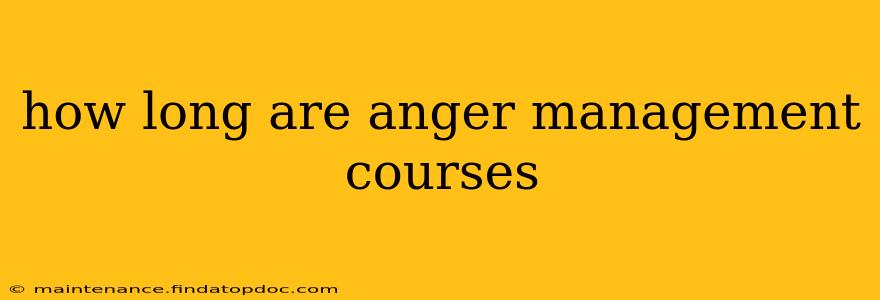Anger management courses vary significantly in length, depending on several factors including the intensity of the program, the provider, and the individual's needs. There's no one-size-fits-all answer, but let's explore the common durations and what influences them.
What Determines the Length of an Anger Management Course?
Several key factors influence the duration of anger management programs:
-
Intensity of the Program: Some programs are short, intensive workshops designed for individuals with mild anger issues. Others are more comprehensive and involve longer-term commitment, suitable for those with severe anger problems or a history of anger-related incidents.
-
Format of the Course: Courses can be offered in various formats, including group therapy sessions, individual counseling, or a combination of both. Group sessions generally involve a set number of meetings over a specific period, while individual therapy is more flexible and tailored to the individual's progress. Online courses also offer varying lengths, depending on the curriculum.
-
Individual Needs: The therapist or program facilitator will assess the individual's specific needs and tailor the program accordingly. Someone with deeply rooted anger issues will likely require a longer course than someone dealing with occasional outbursts. Progress and participation also impact length; if someone isn't actively engaging or showing progress, the program might need to extend.
Common Durations of Anger Management Courses:
While there's no standard length, here are some common scenarios:
-
Short-Term Courses (4-8 weeks): These are typically group-based programs focusing on basic anger management skills, such as identifying triggers, managing stress, and developing coping mechanisms. They may involve weekly sessions of 1-2 hours.
-
Intermediate-Term Courses (8-16 weeks): These programs provide a more in-depth exploration of anger issues, often incorporating individual therapy sessions alongside group work. They might include homework assignments and progress evaluations.
-
Long-Term Courses (16+ weeks or ongoing): Individuals with complex anger issues or co-occurring mental health conditions may require longer-term, ongoing therapy. This allows for deeper exploration of underlying causes and the development of more sophisticated coping strategies.
How Long Are Anger Management Courses for Court-Ordered Participation?
Court-mandated anger management courses often have specific requirements regarding length and content. These are typically longer and more structured than voluntary programs, often lasting several months and involving regular progress reports to the court. The specific requirements vary by jurisdiction and the nature of the offense.
Are there shorter anger management programs?
Yes, there are shorter anger management programs available, often focusing on specific techniques or skills. These might be workshops, seminars, or online modules focusing on stress reduction or communication skills, but they may not offer the same depth as longer programs.
What are the typical components of an anger management course?
Anger management courses generally involve a combination of:
- Education: Learning about anger, its causes, and its effects.
- Skills Training: Developing coping mechanisms, communication skills, and stress management techniques.
- Cognitive Restructuring: Identifying and challenging negative thought patterns.
- Relapse Prevention: Strategies for managing anger in the long term.
- Individual or Group Therapy: Providing a supportive environment to practice and refine new skills.
Ultimately, the length of an anger management course is highly individualized. The best approach is to consult with a mental health professional to determine the most appropriate program length and intensity based on your specific needs and circumstances.
